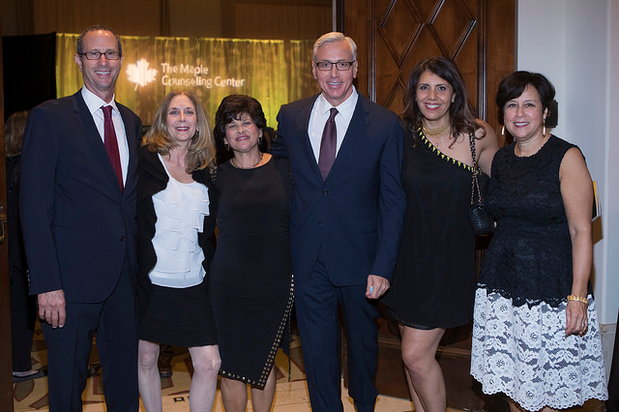When it comes to counseling and getting help for mental illness or personal challenges, there’s still a huge stigma in our society and, frankly, a general misunderstanding on the topic. One organization that continues to push the message forward is The Maple Counseling Center, a center that has been offering low cost comprehensive mental health services to people throughout the Los Angeles County for over 40 years. The local staple turns no one away for lack of funds and also provides training services for mental health professionals, mostly through the generosity of donors and grants.
On October 26, The Maple Counseling Center threw its 42nd annual Maple Ball at the Montage Hotel in Beverly Hills to raise awareness and stress the importance of providing mental health services for anyone in need.
Celebrities and medical professionals alike came out to honor Dr. Drew, who received the Maple Entertainment Media Award for his continual contributions to the mental health community in the public eye. Radio personality Mike Catherwood hosted the event and Jane Lynch (Glee) and Kate Flannery (The Office) were also on site to perform selections from their traveling musical comedy act “See Jane Sing.”
In the midst of applause and laughter, however, the main message of the night was clear: help is available and there should be nothing in the way of getting it.
We spoke with a few celebrities on the red carpet before the night started to get their responses to some of the most common reasons why people don’t go to therapy.
Here is what they had to say:
“I only need to go to therapy if things are completely out of control.”
Dr. Drew: “I went to therapy for 11 years and most of that time I was fine—I’m just saying. There’s different kinds of therapy. Sometimes it’s for real serious symptom relief, sometimes it’s for chronic mental illness. Sometimes it’s to repair your relationships and your relationship with yourself. So things do not have to be out of control—there’s always benefit to be had.”
“People are going to think less of me if I go to therapy.”
Jason Wahler: “If people are going to judge you and if they don’t want to support you in something that you’re trying to do in order to better yourself—first of all, you shouldn’t be surrounding yourself with those people anyways because you shouldn’t care about what those people think. I mean, who are you really trying to impress? I feel like so many people try to impress people they do not know—whether it’s purchasing things they do not have, I mean, there’s just so much stuff that comes into play with stuff. Who are you really trying to impress? I mean, all you have is this life that you live here. It’s about the love, the memories that you create, the legacy you leave behind—you just got to keep it simple, you know, and focus on what makes you happy; stop worrying about what other people think.”
“I should be able to figure out my problems on my own.”
Kate Flannery: “If your life is stuck in a pattern and you’re really not happy, the only way to truly change a pattern is outside help. We can only do so much from the inside. It’s really tough. I feel like it’s no shame—it’s a quick path and you’re actually going to feel the solution. So you can stay in the problem or you can be in the solution, and counseling and the Maple Center and any kind of counselor, any kind of outside help is a gift. So take the gift!”
“Therapy is like paying someone to be your friend.”
Samantha Schacher: “First of all, your friends are always there for you, but a counselor is trained. A counselor is absolutely trained to help you. They will give you tools. Your friend on the other hand—you don’t know what type of biases he or she may have. Good advice can be very dangerous, right? If your friend tells you, “Oh, get over it,” or “There’s nothing wrong with you,” or “Buck up!” that’s the worst thing that a friend can tell you when you are in dire need of some real assistance. So, yeah, you should pick some friends to open up to if that works for you, but at the same time, you absolutely need a counselor, a professional to help you find those tools that you deserve. You deserve to be happy! You deserve to get better! But you can’t do that on your own. You can’t.”
“There are other more effective forms of help besides therapy.”
Dr. Brian: “A very good friend of mine and a colleague is Dr. Matt Torrington and he’s an expert on addiction medicine and treatment. And I’ve learned a lot from him over the years because of his expertise to really understand that number one, of course, this is a real disease, addiction is. And there are ways to treat it beyond just like a medication, but really the best treatments from my understanding are what is a multi-modal approach, meaning not just medication but counseling, behavioral therapy and some other areas all encompasses the support system. And help is available—help is available, as long as you have the insight and acknowledge that you need help.”
If you’d like to support The Maple Counseling Center in any way, you can give a donation on their website today.








